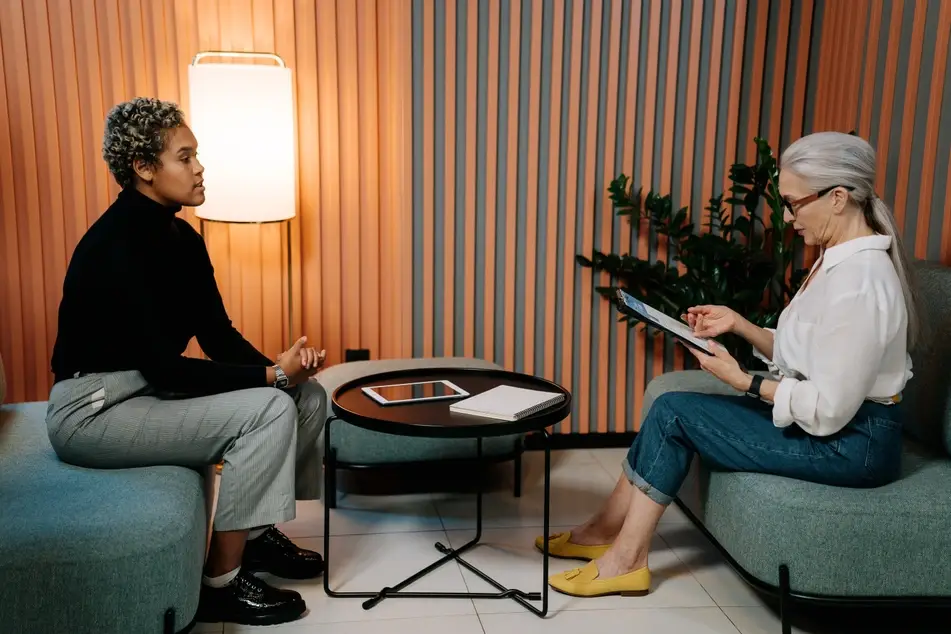5 Common Mid-Interview Realizations (and How to Deal With Them)

You know the feeling. You’re in the middle of an interview, and you suddenly regret your answer to a question, or perhaps even second-guess applying to this job in the first place. You’re not alone—many of us have doubts that surface mid-interview. But instead of letting these thoughts negatively affect your performance, you can take steps to maintain your poise and get through the interview. You may also learn some things that will prepare you for your next one.
1. I’m over-/underdressed
Maybe you showed up to an interview in a suit and tie while the other candidates in the reception area opted for business casual. Or you thought your favorite dress would be perfect, but the interviewer was very buttoned up. As long as you look professional and well put together, you’re probably in the clear. But for next time, remember to research the company culture as part of your job prep. And be sure to dress professionally for video interviews as well—you should wear the same outfit that you would have worn to an in-person interview.
2. I actually don’t want this job
There are a lot of reasons why this particular realization might hit you. Perhaps the day-to-day of the role sounds wildly different than it did in the job description, or maybe you learned that the salary is not what you expected. You might have applied to it on a whim and didn’t think you’d get an interview. Whatever the reason, you should still show interest and enthusiasm throughout the interview. After all, you may change your mind—the salary could turn out to be negotiable, or you might just want to keep the interview process going until you hear back from other jobs. And even if you don’t want this particular position, the same company might have another job that interests you more. It’s never a bad idea to make good connections!
3. I don’t like the interviewer
When you have a negative reaction to the person interviewing you, it’s worth paying attention to. You don’t want to join an organization where you’re not a fit with the people or culture. And a rude or dismissive hiring manager can sometimes be a red flag. For example, an interviewer belittling your achievements or speaking negatively about the person who had the role previously could be an indication of a toxic work environment. If this is how they conduct themselves in an interview, think about what your working relationship will be like when they’re not on their best behavior. On the other hand, if this is a position you really want, consider who the interviewer is in the organization. Is this someone who you’re going to be reporting to, or is this just an initial HR screen? It may be worth waiting to meet the people you’ll be working with directly before ruling out the job completely.
4. All my talking points are outdated
“Can you give me an example of a time when....?”
We all know to prepare for these kinds of questions. But if you have an extensive work history, sometimes your “greatest hits” that you tend to refer to are far in the past. If you’re in an interview and you noticed you’ve been using examples from over a decade ago, try to come up with more recent accomplishments. You can even add on to a question that you already answered, or bring it up later in the interview. And for next time, you might want to write up some talking points to review beforehand.
5. I would be in over my head at this job
Are you nodding your head in agreement as the scope of the work is described, but thinking to yourself that you’re not at all qualified for the position? Relax. Unless your resume is a work of fiction, the employer saw something in your background and qualifications that made them want to interview you. It’s also good to remember that job descriptions can sometimes be all-encompassing, and you should always ask for further detail on day-to-day responsibilities. If you’re worried that you lack proficiency in particular tech or computer skills, you can easily pick them up (often through online tutorials).
While the interview process can be stressful, maintaining your composure through those awkward moments of doubt can help get you to the next step in the process. It’s better to get through it and have the time to carefully reflect on the job, consider whether it would be a good fit, and then make an informed decision. Whether you get called back or not, talking to potential new colleagues is always good practice—each interview gives you the chance to be better prepared for the next one.
***
How do you deal with feelings of doubt mid-interview? Let us know on Facebook!
Lakshmi Hutchinson is a freelance writer with experience in the nonprofit, education, and HR fields. She is particularly interested in issues of educational and workplace equity, and in empowering women to reach their professional goals. She lives in Glendale, California with her husband, twin girls, and tuxedo cat.


